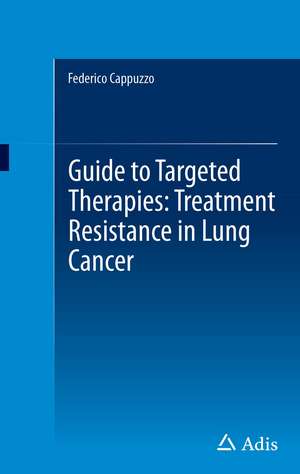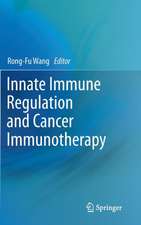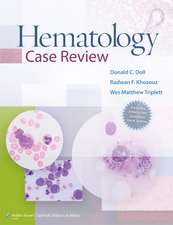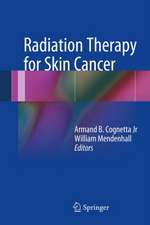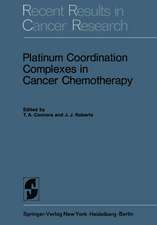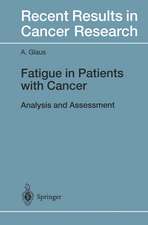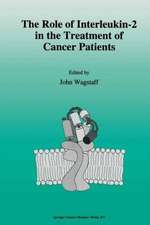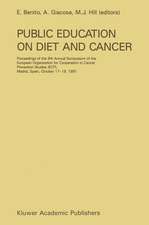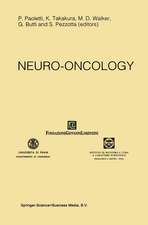Guide to Targeted Therapies: Treatment Resistance in Lung Cancer
Autor Federico Cappuzzoen Limba Engleză Paperback – 26 oct 2015
| Toate formatele și edițiile | Preț | Express |
|---|---|---|
| Paperback (2) | 320.23 lei 43-57 zile | |
| Springer International Publishing – 26 oct 2014 | 320.23 lei 43-57 zile | |
| Springer International Publishing – 26 oct 2015 | 320.73 lei 38-44 zile |
Preț: 320.73 lei
Preț vechi: 337.62 lei
-5% Nou
Puncte Express: 481
Preț estimativ în valută:
61.38€ • 63.76$ • 50.99£
61.38€ • 63.76$ • 50.99£
Carte tipărită la comandă
Livrare economică 29 ianuarie-04 februarie 25
Preluare comenzi: 021 569.72.76
Specificații
ISBN-13: 9783319207407
ISBN-10: 3319207407
Pagini: 100
Ilustrații: VII, 67 p. 14 illus. in color.
Dimensiuni: 127 x 201 x 7 mm
Greutate: 0.12 kg
Ediția:1st ed. 2015
Editura: Springer International Publishing
Colecția Adis
Locul publicării:Cham, Switzerland
ISBN-10: 3319207407
Pagini: 100
Ilustrații: VII, 67 p. 14 illus. in color.
Dimensiuni: 127 x 201 x 7 mm
Greutate: 0.12 kg
Ediția:1st ed. 2015
Editura: Springer International Publishing
Colecția Adis
Locul publicării:Cham, Switzerland
Public țintă
Professional/practitionerCuprins
1 Introduction
References
2 Therapy options for advanced NSCLC
First-line chemotherapy and anti-angiogenic agents
First-line EGFR tyrosine kinase inhibitors
ALK inhibitors
References
3 Resistance to EGFR TKIs
Primary resistance to EGFR-TKIs
Acquired resistance to EGFR-TKIs
References
4 Overcoming EGFR-TKI resistance
Overcoming resistance with EGFR-targeted agents
Overcoming EGFR-TKI resistance by targeting alternate pathways
References
5 Resistance to crizotinib and therapeutic options
Target-dependent mechanisms
Non-target-dependent mechanisms
Crizotinib beyond progression
Second-generation ALK inhibitors
Other agents
References
6 Resistance to anti-angiogenic drugs and therapeutic options
References
7 Conclusion
References
2 Therapy options for advanced NSCLC
First-line chemotherapy and anti-angiogenic agents
First-line EGFR tyrosine kinase inhibitors
ALK inhibitors
References
3 Resistance to EGFR TKIs
Primary resistance to EGFR-TKIs
Acquired resistance to EGFR-TKIs
References
4 Overcoming EGFR-TKI resistance
Overcoming resistance with EGFR-targeted agents
Overcoming EGFR-TKI resistance by targeting alternate pathways
References
5 Resistance to crizotinib and therapeutic options
Target-dependent mechanisms
Non-target-dependent mechanisms
Crizotinib beyond progression
Second-generation ALK inhibitors
Other agents
References
6 Resistance to anti-angiogenic drugs and therapeutic options
References
7 Conclusion
Notă biografică
Federico Cappuzzo, MD, has been the Director of the medical oncology department at the Istituto Toscano Tumori-Ospedale Civile-Livorno in Livorno, Italy since January 2010. In November 1992, he graduated, summa cum laude, in medicine and surgery at the Palermo University. In November 1996, he gained a degree, summa cum laude, in medical oncology at Milan University, followed by the European Society for Medical Oncology (ESMO) certification in medical oncology in 1997. From 1997 to 1999, he was recipient of an ESMO Fellowship on Gene Therapy of Lung Cancer at Institut Gustave Roussy in Villejuif (Paris). He then was an attending physician at the thoracic oncology unit at the Medical University of South Carolina in Charleston from April 2000 to September 2000. For six years, from November 2000 to 2006, he was an assistant professor at Ospedale Bellaria in Bologna. From November 2006 to January 2010, Dr Cappuzzo was an assistant professor in medical oncology at Istituto Clinico Humanitas IRCCS in Rozzano (Milan), and from January 2004 to November 2004 he was a visiting associate professor in medical oncology at University of Colorado in Denver. Dr Cappuzzo is a member of the Italian Association in Medical Oncology (AIOM), ESMO, American Society Clinical Oncology (ASCO), International Association for the Study of Lung Cancer (IASCL), and since 2006 has been a member of the editorial board of Lung Cancer. In 2006 and 2009, he received research grants from the Italian Association for Cancer Research (AIRC) on targeted therapies in lung cancer and is the author of more than 150
papers in peer-review journals, mainly in translational research in lung cancer.has been the Director of the medical oncology department at the Istituto Toscano Tumori-Ospedale Civile-Livorno in Livorno, Italy since January 2010. In November 1992, he graduated, summa cum laude, in medicine and surgery at the Palermo University. In November 1996, he gained a degree, summa cum laude, in medical oncology at Milan University, followed by the European Society for Medical Oncology (ESMO) certification in medical oncology in 1997. From 1997 to 1999, he was recipient of an ESMO Fellowship on Gene Therapy of Lung Cancer at Institut Gustave Roussy in Villejuif (Paris). He then was an attending physician at the thoracic oncology unit at the Medical University of South Carolina in Charleston from April 2000 to September 2000. For six years, from November 2000 to 2006, he was an assistant professor at Ospedale Bellaria in Bologna. From November 2006 to January 2010, Dr Cappuzzo was an assistant professor in medical oncology at Istituto Clinico Humanitas IRCCS in Rozzano (Milan), and from January 2004 to November 2004 he was a visiting associate professor in medical oncology at University of Colorado in Denver. Dr Cappuzzo is a member of the Italian Association in Medical Oncology (AIOM), ESMO, American Society Clinical Oncology (ASCO), International Association for the Study of Lung Cancer (IASCL), and since 2006 has been a member of the editorial board of Lung Cancer. In 2006 and 2009, he received research grants from the Italian Association for Cancer Research (AIRC) on targeted therapies in lung cancer and is the author of more than 150 papers in peer-review journals, mainly in translational research in lung cancer.
papers in peer-review journals, mainly in translational research in lung cancer.has been the Director of the medical oncology department at the Istituto Toscano Tumori-Ospedale Civile-Livorno in Livorno, Italy since January 2010. In November 1992, he graduated, summa cum laude, in medicine and surgery at the Palermo University. In November 1996, he gained a degree, summa cum laude, in medical oncology at Milan University, followed by the European Society for Medical Oncology (ESMO) certification in medical oncology in 1997. From 1997 to 1999, he was recipient of an ESMO Fellowship on Gene Therapy of Lung Cancer at Institut Gustave Roussy in Villejuif (Paris). He then was an attending physician at the thoracic oncology unit at the Medical University of South Carolina in Charleston from April 2000 to September 2000. For six years, from November 2000 to 2006, he was an assistant professor at Ospedale Bellaria in Bologna. From November 2006 to January 2010, Dr Cappuzzo was an assistant professor in medical oncology at Istituto Clinico Humanitas IRCCS in Rozzano (Milan), and from January 2004 to November 2004 he was a visiting associate professor in medical oncology at University of Colorado in Denver. Dr Cappuzzo is a member of the Italian Association in Medical Oncology (AIOM), ESMO, American Society Clinical Oncology (ASCO), International Association for the Study of Lung Cancer (IASCL), and since 2006 has been a member of the editorial board of Lung Cancer. In 2006 and 2009, he received research grants from the Italian Association for Cancer Research (AIRC) on targeted therapies in lung cancer and is the author of more than 150 papers in peer-review journals, mainly in translational research in lung cancer.
Caracteristici
A concise, practical handbook on treatment resistance in lung cancer
Provides oncologists and other healthcare workers involved in the diagnosis, treatment and management of patients with an up-to-date review of the background and advances in the field
Easily accessible text, tables and images reviews the critical clinical trials, giving readers a fast synopsis of key studies and available treatment options
Includes supplementary material: sn.pub/extras
Provides oncologists and other healthcare workers involved in the diagnosis, treatment and management of patients with an up-to-date review of the background and advances in the field
Easily accessible text, tables and images reviews the critical clinical trials, giving readers a fast synopsis of key studies and available treatment options
Includes supplementary material: sn.pub/extras
Textul de pe ultima copertă
Guide to Targeted Therapies: EGFR Mutations in NSCLC is a speedy and up-to-date review, which discusses EGFR mutations, testing methods and technology, current and emerging therapies, and resources that clinicians can provide to their patients. Busy healthcare professionals who want a quick review of EGFR gene mutations as well as a summary of current therapies will benefit from this succinct guide.
